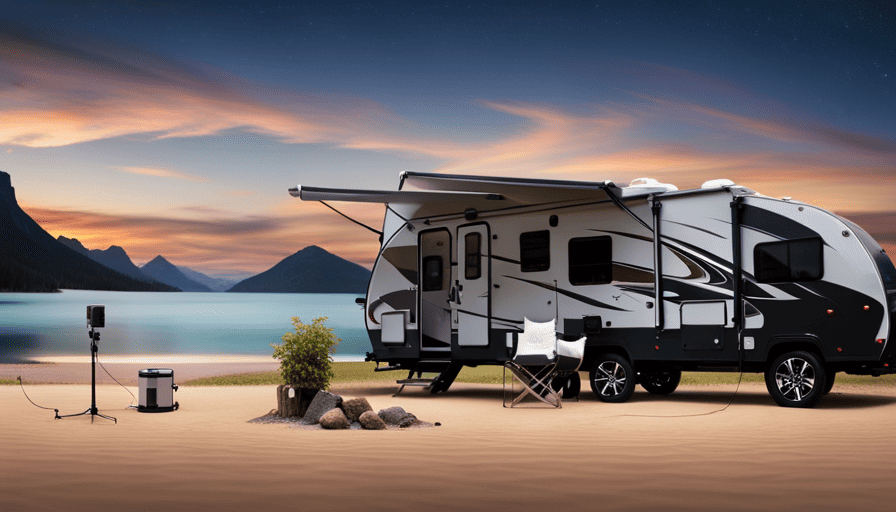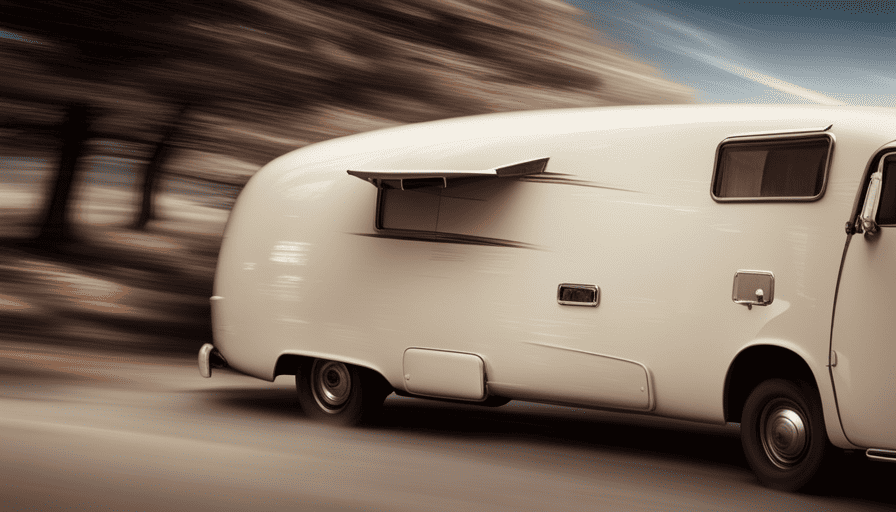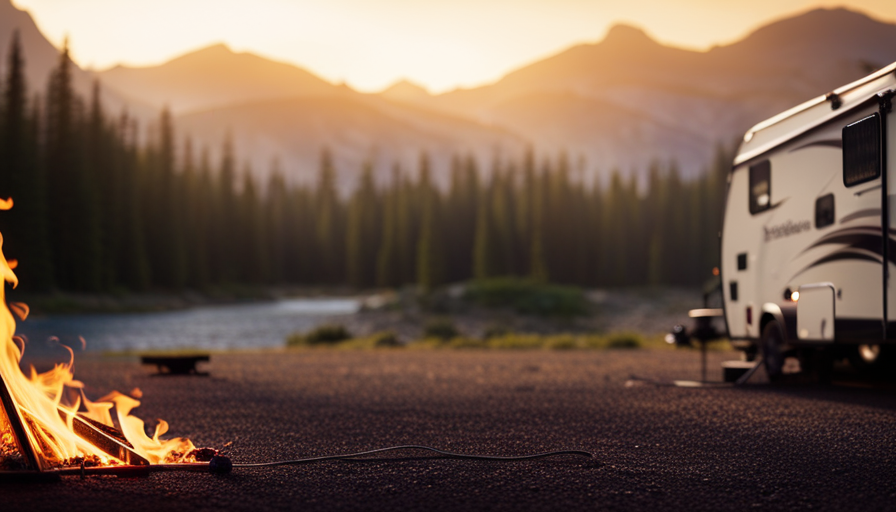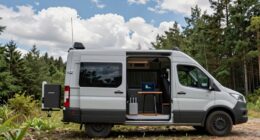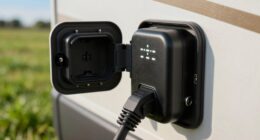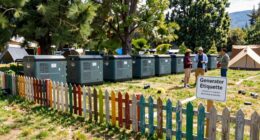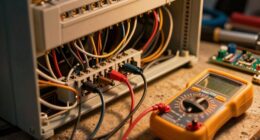As someone who loves camping, I’ve always been intrigued by how my camper’s electrical system operates. There’s this one camping trip I remember vividly, during which I was in a secluded spot with scarce power resources. The location was stunning, yet I soon noticed that the electrical consumption of my camper was depleting my battery quicker than I had expected.
That experience made me realize the importance of understanding how many amps a camper uses and how to effectively manage power consumption.
In this article, we will delve into the world of camper electrical systems, exploring the factors that determine power needs, as well as strategies for optimizing efficiency. We will discuss how to choose the right electrical hookup, monitor battery usage, plan for backup power, troubleshoot power issues, and prioritize safety precautions.
So if you’re a camper who wants to make the most out of your electrical system, join me on this technical journey as we unravel the mysteries of amp usage in campers.
Key Takeaways
- Understanding amps is crucial for managing electrical usage in a camper.
- Assessing power needs involves identifying appliances and calculating their amp ratings.
- Choosing the right electrical hookup (30-amp or 50-amp) depends on power requirements and appliances used.
- Conserving power while camping can be achieved through propane usage, unplugging unused devices, and utilizing natural light.
Understanding Amps and Electrical Usage
Understanding how many amps a camper uses is essential for managing electrical usage. Assessing power capacity and understanding electrical limits are crucial steps in ensuring the smooth operation of all electrical systems within the camper.
Amps, short for amperes, measure the amount of electric current flowing through a circuit. In the context of a camper, knowing the amp rating of different appliances and devices will help determine how much power is needed and whether it exceeds the camper’s electrical capacity. This information is vital in preventing overloading and potential electrical hazards.
To assess the power needs of your camper, start by identifying the amp rating of each appliance or device. This can usually be found on the product label or in the manufacturer’s specifications. Make a list of all the electrical components in your camper and note down their respective amp ratings. Once you have this information, add up the amp ratings to get a total.
Compare this total with the camper’s electrical capacity, which is typically measured in amps as well. If the total exceeds the camper’s capacity, adjustments may need to be made, such as using appliances with lower amp ratings or upgrading the camper’s electrical system.
Understanding the amp usage of a camper is crucial for ensuring safe and efficient electrical operation. By assessing power capacity and understanding electrical limits, you can make informed decisions about managing your camper’s electrical usage.
Assessing the Power Needs of Your Camper
In assessing the power needs of my camper, I first need to identify all the appliances and devices that I’ll be using. This includes everything from the refrigerator and air conditioner to smaller items like cell phone chargers and laptops.
Once I have a comprehensive list, I can then calculate the total amps required by adding up the individual amp ratings of each device. By taking these steps, I can ensure that I have enough power to meet all my camping needs.
Identifying the Appliances and Devices
Hey, have you ever thought about all the appliances and devices in your camper and how much power they actually use? It’s important to assess the power needs of your camper to ensure you have enough electricity to run everything smoothly. To do this, you need to identify all the appliances and devices you plan to use while camping. A good way to visualize this is by creating a table that lists each item and its corresponding power usage in amps. Here’s an example:
| Appliance/Device | Power Usage (amps) |
|---|---|
| Fridge | 3 |
| Air Conditioner | 15 |
| Microwave | 10 |
| TV | 2 |
| Lights | 1 |
Calculating the total amps required for your camper is crucial for optimizing energy usage. In the next section, we’ll delve into the process of determining the total amps and ensuring you have enough power for your camping adventures.
Calculating the Total Amps Required
To accurately determine the total power needed for your camping adventures, you’ll want to calculate the combined electrical requirements of all your appliances and devices in order to ensure a seamless and stress-free experience.
Calculating power consumption and estimating electrical needs is essential for understanding how many amps your camper will use. Here are three steps to help you in this process:
- Make a list of all the appliances and devices you plan to use during your camping trip.
- Research and find the power consumption (in watts) of each item on your list.
- Convert the power consumption from watts to amps using the formula: Amps = Watts / Volts.
By following these steps, you’ll have a clear idea of the total amps required for your camper. This knowledge will enable you to manage power consumption efficiently and avoid any electrical issues during your camping adventure.
Managing Power Consumption
When managing power consumption in my camper, I prioritize essential appliances to ensure that I have enough power for the most important functions.
I also use energy-efficient lighting options to minimize power usage and maximize the battery life.
Additionally, I make a conscious effort to limit the use of high-power appliances to prevent overloading the electrical system and conserve power for longer trips.
Prioritizing Essential Appliances
One important aspect of camping is figuring out which appliances are essential and how many amps they use. Managing power consumption is crucial to ensure that the camper’s electrical system can handle the load.
To do this, it’s necessary to prioritize essential appliances and determine their amp usage. By doing so, campers can effectively manage their power consumption and avoid overloading the system.
One way to minimize power usage is by using energy-efficient lighting. Energy-efficient lighting options, such as LED bulbs, consume significantly fewer amps compared to traditional incandescent bulbs. These lights not only provide sufficient illumination but also help conserve energy, prolonging the camper’s battery life.
Prioritizing essential appliances and using energy-efficient lighting are key steps in optimizing power consumption during camping trips.
Using Energy-efficient Lighting
Switching to energy-efficient lighting will brighten up your campsite like a starlit sky, while also saving on power consumption. When choosing lighting for your camper, opt for LED bulbs as they’re highly energy efficient and last longer than traditional incandescent bulbs.
LED lights draw less power and produce minimal heat, making them ideal for a camper’s limited power supply. Additionally, consider installing solar-powered lights, which harness the sun’s energy during the day and provide illumination at night without relying on your camper’s battery.
By incorporating energy-efficient lighting options and solar power integration, you can significantly reduce your power usage and extend the lifespan of your camper’s battery. This will ensure that you have enough power to operate other essential appliances during your camping trip.
Transitioning into the next section, it’s also important to limit high-power appliances to conserve power further.
Limiting High-power Appliances
To conserve power, limit your use of high-power appliances while camping in order to extend the lifespan of your camper’s battery. By limiting power usage, you can ensure that your battery lasts longer and you can avoid potential issues with power shortage.
Consider using alternative power sources such as solar panels or generators to supplement your camper’s power needs. These sources can provide additional electricity without putting excessive strain on your battery.
Additionally, choosing the right electrical hookup for your camper can also help in managing power usage effectively. This includes selecting the appropriate amperage and ensuring that the hookup is compatible with your camper’s electrical system.
With these measures in place, you can maximize your camper’s power efficiency and enjoy your camping experience without worrying about power limitations.
Choosing the Right Electrical Hookup
When you’re looking for the right electrical hookup for your camper, it’s important to consider the number of amps it uses to ensure a smooth and efficient power supply.
Choosing the right power source for your camper is crucial because different campsites offer varying electrical hookups with different amp ratings. Understanding electrical voltage is also essential in making the right choice.
Campers generally use either a 30-amp or a 50-amp electrical hookup. A 30-amp hookup provides a maximum of 3,600 watts or 30 amps of electrical power, while a 50-amp hookup offers up to 12,000 watts or 50 amps. The choice between the two depends on the power requirements of your camper and the appliances you plan to use.
It’s important to note that using a 30-amp hookup may limit your ability to run high-power appliances simultaneously.
Transitioning to the subsequent section about monitoring battery usage, it’s crucial to keep track of your camper’s power consumption to ensure optimal battery performance and prevent any unexpected power failures.
Monitoring Battery Usage
Keep an eye on your battery usage to ensure optimal performance and prevent unexpected power failures in your camper. Monitoring battery health is crucial in maximizing the lifespan and efficiency of your camper’s electrical system.
By regularly checking the battery’s voltage and charge level, you can identify any potential issues early on and take appropriate action. Additionally, monitoring battery usage allows you to optimize charging efficiency. This involves understanding the charging process, such as the appropriate voltage and amperage for your specific battery type. By ensuring the battery is charged properly, you can prevent overcharging or undercharging, which can both negatively impact battery health.
Furthermore, monitoring battery usage allows you to identify any power-hungry appliances or devices that may be draining the battery excessively. This knowledge can help you make informed decisions about power management and conservation.
By monitoring and optimizing your battery usage, you can enjoy a reliable power supply in your camper.
In the next section, we will discuss some tips for conserving power and further extending your battery’s life.
Tips for Conserving Power
When it comes to conserving power while camping, there are several key tips to keep in mind.
First, using propane for cooking and heating can greatly reduce the amount of electricity needed.
Second, unplugging unused devices can prevent unnecessary power drain.
Lastly, utilizing natural light whenever possible can help minimize the need for artificial lighting.
By following these tips, I can ensure that I’m maximizing my power usage efficiency while camping.
Using Propane for Cooking and Heating
To maximize the coziness of your camper, you’ll want to rely on propane for cooking and heating, as it adds a warm touch to your camping experience. Propane is a safe and efficient fuel source that can be used for various appliances in your camper. When it comes to cooking, propane-powered stoves provide instant heat and precise temperature control, allowing you to prepare meals with ease. Additionally, propane heaters can quickly warm up your camper, providing a comfortable environment even on chilly nights. Compared to electric appliances, propane-powered ones often have lower energy consumption, making them more cost-effective in the long run. By utilizing propane for cooking and heating, you’ll be able to enjoy a cozy and efficient camping experience. In the next section, we will explore the importance of unplugging unused devices to further conserve power.
Unplugging Unused Devices
Make sure you unplug any devices that aren’t being used to maximize your camping experience and conserve power. This is one of the most effective energy-saving strategies while camping. By unplugging unused devices, you can significantly reduce the amount of power being consumed and extend the battery life of your camper.
Here are three reasons why you should unplug unused devices:
-
It reduces standby power consumption: Many devices continue to draw power even when they’re not in use. Unplugging them completely eliminates this standby power consumption.
-
It saves battery life: Unplugging unused devices ensures that your camper’s battery isn’t drained unnecessarily, allowing it to last longer and provide power when you need it.
-
It minimizes the risk of electrical accidents: Unplugging devices reduces the chances of electrical malfunctions or short circuits, making your camping experience safer.
By implementing these energy-saving strategies, you can make the most of your camping trip.
Now, let’s explore the next section on utilizing natural light.
Utilizing Natural Light
Maximize your camping experience by harnessing the power of natural light to brighten up your surroundings. When camping, it’s essential to maximize sunlight to create a well-lit and inviting space. One way to achieve this is by incorporating skylights into your camper’s design. Skylights allow natural light to flood in, illuminating the interior and creating a sense of openness.
Not only does this reduce the need for artificial lighting during the day, but it also connects you with the beauty of the outdoors. By strategically placing skylights in areas where you spend the most time, such as the living area or kitchen, you can make the most of the available sunlight.
Planning for backup power is crucial in case natural light isn’t sufficient, so let’s explore this next step.
Planning for Backup Power
Ensure you have enough backup power for your camper by calculating the amps it will require. When planning for backup power options, there are two main choices: a generator or solar power.
A generator is a reliable source of power that can provide a steady flow of electricity to meet the demands of your camper. It runs on fuel and produces the necessary amps needed to power your appliances and devices.
On the other hand, solar power is a more environmentally friendly option. It harnesses the energy from the sun and converts it into electricity, which can then be used to power your camper. However, it’s important to note that solar power may not be as consistent as a generator, especially on cloudy days or during the night.
Therefore, it’s crucial to consider the power requirements of your camper and choose the backup power option that best suits your needs.
Planning for backup power is essential to ensure a seamless camping experience. However, even with proper planning, power issues may still arise.
In the next section, we’ll discuss troubleshooting power issues and how to address them effectively.
Troubleshooting Power Issues
When troubleshooting power issues in a camper, it’s important to first identify any tripped breakers. This can be done by visually inspecting the breaker panel and resetting any breakers that are in the ‘off’ position.
Additionally, checking for wiring faults is crucial in pinpointing the source of the power problem. This involves examining the wiring connections for any loose or damaged wires, and using a multimeter to test for continuity and voltage.
Identifying Tripped Breakers
To identify tripped breakers in a camper, you can simply check if any of the switches are in the ‘off’ position. If you notice a breaker switch that isn’t aligned with the others, it’s likely tripped. To reset tripped breakers, first, switch off the breaker by pushing it to the ‘off’ position, and then switch it back on by pushing it to the ‘on’ position. This should restore power to the affected circuit.
When troubleshooting electrical problems, it’s important to remember that tripped breakers are a common cause of power issues in campers.
Frustration: Dealing with power outages in the middle of a camping trip can be incredibly frustrating.
Relief: Resetting a tripped breaker and having the power come back on brings a sense of relief.
Confidence: Knowing how to identify and reset tripped breakers gives campers confidence in handling electrical issues.
In the next section, we’ll discuss checking for wiring faults.
Checking for Wiring Faults
You can easily identify any wiring faults in your camper by inspecting the condition of the electrical wires and looking for signs of damage or fraying. Start by checking electrical connections to ensure they’re secure and free from corrosion.
Use a multimeter to test circuit breakers and make sure they’re functioning properly. Look for any loose or exposed wires that may be a potential hazard. Additionally, examine the insulation on the wires for any cracks or breaks.
If you notice any abnormalities, it’s important to address them immediately to prevent electrical issues or potential accidents.
By thoroughly checking for wiring faults, you can ensure the safety and proper functioning of your camper’s electrical system.
Safety Precautions
One important safety precaution is ensuring that the camper doesn’t exceed its maximum amp usage. This is crucial because exceeding the amp capacity can result in electrical hazards and potentially lead to fires or damage to the electrical system.
To prevent this, it’s essential to understand the camper’s electrical system and the maximum amperage it can handle. To start, it’s recommended to familiarize yourself with the safety measures outlined in the camper’s manual. This will provide specific instructions on how to safely use the electrical system and avoid any potential risks.
Additionally, regularly inspecting the wiring and connections for any faults or damage is important to prevent electrical issues.
When using the camper, it’s vital to be mindful of the power consumption of each appliance or device. Keep track of the amp usage and ensure that it doesn’t exceed the maximum capacity of the camper. This can be done by using a portable amp meter to measure the electrical load.
Taking safety precautions to avoid exceeding the camper’s maximum amp usage is crucial to prevent electrical hazards and ensure a safe camping experience. By being aware of the camper’s electrical system, regularly inspecting for faults, and monitoring amp usage, you can minimize the risk of electrical issues. Seeking professional help can further ensure the safety and proper functioning of the camper’s electrical system.
Seeking Professional Help
If you’re serious about keeping your camping experience safe and worry-free, don’t hesitate to bring in the pros for assistance with your camper’s electrical system. Seeking professional advice is crucial when it comes to dealing with the electrical aspects of your camper.
Finding reliable experts who are knowledgeable about camper electrical systems can save you from potential hazards and ensure that everything is working properly.
Here are three reasons why seeking professional help is essential:
-
Expertise: Reliable professionals have the knowledge and experience to accurately assess your camper’s electrical system. They can identify any potential issues or hazards and provide solutions to prevent accidents or damage.
-
Safety: Electrical systems can be complex and dangerous if not handled correctly. Professionals are trained to work with electricity safely, minimizing the risk of shocks, fires, or other accidents. They can also advise you on safety precautions and best practices to follow.
-
Efficiency: Professionals can troubleshoot and diagnose electrical problems quickly and efficiently. They have the necessary tools and resources to get the job done right the first time, saving you time and frustration.
When seeking professional help, make sure to do your research and find reliable experts in camper electrical systems. Look for certifications, customer reviews, and recommendations from others in the camping community. By finding the right professionals, you can have peace of mind knowing that your camper’s electrical system is in good hands.
Frequently Asked Questions
Can I run my air conditioner and other appliances simultaneously in my camper?
Yes, I can run my air conditioner and other appliances simultaneously in my camper. To do this, I ensure that I’m using a running generator and energy-efficient appliances. The running generator provides enough power to support multiple appliances, while the energy-efficient appliances consume less electricity.
This combination allows me to comfortably use my air conditioner and other appliances without any issues.
How long can I run my camper’s refrigerator on battery power?
Running a camper’s refrigerator on battery power can vary depending on the capacity and energy efficiency of the battery. However, it’s generally recommended to use alternative power sources such as propane for running the camper fridge. Propane is a reliable and efficient option that can provide longer-lasting power for the refrigerator.
It’s important to consider the battery’s capacity and the refrigerator’s energy consumption to determine the exact duration of running the fridge on battery power.
What is the average power consumption of a camper’s water heater?
The average power consumption of a camper’s water heater depends on various factors, such as the average water temperature desired and the energy efficiency of the water heater.
There are energy-efficient water heater options available for campers, which can help reduce power consumption. These options utilize advanced insulation and heating technologies to minimize energy usage.
It’s important to consider these options when choosing a water heater for your camper to optimize power consumption.
Can I charge my camper’s battery using solar panels?
Sure, let’s dive into the world of solar-powered battery charging for campers. I can harness the power of the sun to charge my camper’s battery using solar panels. The efficiency of solar panels has come a long way, allowing for a reliable and sustainable source of energy. However, remember to consider the charging compatibility and capacity of your camper’s battery to ensure efficient power transfer.
Now, let’s address the question of how many amps a camper uses.
How many amps does a camper’s microwave typically require?
A camper’s microwave typically requires a certain power rating, which is measured in watts. The power rating can vary depending on the specific model and size of the microwave, but it’s typically around 700-1000 watts. To determine the amps required, you can divide the power rating by the voltage of your camper’s electrical system. Alternatively, campers can consider alternative cooking options such as propane stoves or portable grills.
What is the Amp Usage of an Air Conditioner in a Camper?
The camper ac amp usage explained determines the electrical energy consumed by an air conditioner in a camper. This value varies depending on the AC unit’s size and capabilities. To prevent overloading the electrical system, it’s crucial to understand the camper AC amp usage and ensure that the power source can handle it properly.
Conclusion
In conclusion, understanding the electrical needs of your camper is crucial for a successful and enjoyable camping experience. By assessing power consumption, choosing the right electrical hookup, and monitoring battery usage, you can ensure a steady and reliable power supply.
One interesting statistic to note is that the average camper uses approximately 30-50 amps of power per day. By following safety precautions and seeking professional help when needed, you can avoid power issues and have a worry-free camping trip.

